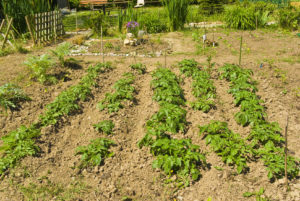As early as this summer, the population of Opitciwan will be able to grow its own vegetables or buy some at the grocery store, thanks to an exciting and promising project which is arousing a great deal of enthusiasm and hope in the Atikamekw community.

About two years ago, Ernest Awashish, who is the economic development officer in the community of Opitciwan, had the idea of this project. His hope was that community members could buy fruits and vegetables that were fresher than those actually sold at the Opitciwonok grocery store, produces that are trans- ported from Saguenay-Lac-Saint-Jean. Besides being of better quality, the fruits and vegetables will be more affordable.
The project aims to achieve several objectives, the most important of which are to improve and develop healthy eating and lifestyle choices amongst community members, end food insecurity, and create economic benefits in the community. To bring the idea to fruition, several partners have been called upon, including the Centre d’innovation sociale en agriculture (CISA), the Quebec Department of Agriculture, Fisheries and Food (MAPAQ) and the Social Sciences and Humanities Research Council (SSHRC).
A Two-Phased Project
The project is divided in two specific areas: a collective part (commercial) and another one that is community-based. The collective part foresees in a first step the acquisition of two very large greenhouses. The commercial production in those two greenhouses will begin in two years and will serve to supply the Opitciwonok grocery store. If there are fruit and vegetable surpluses, they will be sold outside the community, in Chibougamau or in Saguenay-Lac-Saint-Jean for example.
As for the community aspect, it foresees the establishment of community-based gardens which could be maintained by community institutions and organizations. The secondary school, the Elders’ Home and the Early Childhood Centre (CPE) have in fact indicated an interest in participating in the project. Plots of land will also be allocated to families and individuals who will cultivate and maintain them, and harvest their productions. The community part of this greenhouse growing project sets out first to train the participants, raise the awareness of the population about this new activity and « citizen » ownership of the project by the people of the community. This component will serve as a stepping stone for the participants who will want to continue to grow fruits and vegetables with the future cooperative that will be formed to manage this project.
Consultation in The Community and Participation
The collective part of this project has been presented to the community members in the fall of 2018. At the time, some twelve people or so indicated an interest. A second meeting is planned for March 2019 for the submission of plans for the gardens and greenhouses to the population. Chances are that other participants will join in following that presentation. At that meeting, the varieties of fruits and vegetables to be grown will be selected, because they want to make sure that all the crops will be consumed. As far as the community component goes, it will be the coordinators and officials of the interested institutions that will recruit the participants amongst their clienteles.
Course and Duration of the Project
The goal of the project promoters is to start using the green- houses this year, but it will be a challenge, because before doing so, they must ensure that a good system supplying water and heat is put in place. Also, large quantities of good soil and compost must be purchased, because the soil in Opitciwan is very sandy and not fertile for agriculture. In addition, fences must be erected around the community gardens to protect it against dogs and vandalism.
To ensure that the project is progressing well, two persons will be hired by Opitciwan Economic Development. CISA also hired two students in Anthropology to mobilize the community and to monitor the achievements of the project. In addition, two stu- dents in agricultural business management technique will join the team to accompany the community in the establishment and maintenance of the gardens. There should be a five-person field team, in total. The study aims to identify success factors and define the next steps, which could be used by other communities who would like to implement a similar project.
The project is currently under way for a period of three years and they are in their first year. The objective of CISA is to offer even more comprehensive support that would allow them to with- draw from the project at the end, while ensuring that it will be taken over by the community. In fact, Mr. Awashish hopes that this project becomes permanent. He’s also confident that young people will develop an interest for agriculture through promo- tional, awareness-raising and training activities to be organized.
For other community-based initiatives, we invite you to consult our local economic development section.




